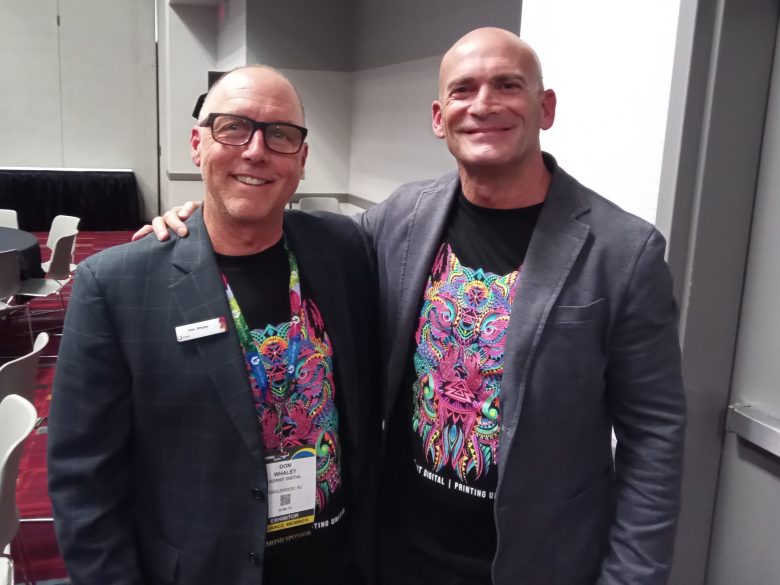
Textile printing specialist Kornit Digital extolled the virtues of sustainable on demand printing at Printing United Expo in Las Vegas.
The company actively encourages retailers and brands to “be the change” by embracing digital production to succeed in a rapidly transforming fashion and textile industry.
Kornit Digital CEO Ronen Samuel believes the company can empower the industry to adapt for what he calls, “the new rules of supply and demand, unleashing unlimited creativity at the speed of e-commerce”.
He said, “Across the industry, the laws of supply and demand are quickly reversing. No longer must retailers and brands try to sell what’s already been produced, carrying unnecessary inventory and relying on supply chains that are often damaged or broken.
“High-volume, on demand production effectively addresses this challenge, all while providing the highest levels of quality, efficiency, and sustainability. For the first time in three years, we’re very excited to be in Las Vegas live to showcase how Kornit is powering this industry change.”
The company is showing its complete portfolio of high volume digital production saying its direct to garment and direct to fabric solutions reflect the company’s dedication to ensuring brands and retailers can succeed in an industry often defined by waste and overproduction.

The Kornit Atlas Max targets high quality mass customisation for textile printing, for example, printing polyester and poly-blended sportswear with vibrant colour, and custom fabrics for fashion, home-décor, and other applications.
The Kornit Apollo platform delivers highly automated, digital mass production on demand. Kornit said this end-to-end system ensures optimal total cost of ownership and the highest output per operator, with expected availability in mid-2023.
Also at the show was the KornitX workflow solution, which enables “the industry to realise the promise of on-demand, end-to-end fulfilment and production”. Kornit’s new Smart Curing solution targets highly durable and high-quality finished products.
Kornit said its integrated portfolio enables companies to adopt lean and agile, on demand fulfilment more effectively, from pixel to parcel to doorstep.
Samuel said, “Through the power of high volume, on-demand production, companies are now better able to adopt nearshoring. Massive overproduction is a problem with so much product thrown away to landfill, creating more pollution. The digital world enables us to change this situation. We can see a movement from large quantity offshore production in say China or Bangladesh, to keeping it onshore”.
In conjunction with the Printing United Expo, Kornit has issued its second annual Impact Report, reinforcing a commitment to long-term sustainability and underscoring its forward looking strategy across the environmental, social, and corporate governance framework.
This year’s report further expands the company’s long-term roadmap for evolving the world of fashion and textiles into one that is more sustainable and highly efficient with the aim of creating a better planet for everyone.
Samuel said, “This long-term sustainability strategy reflects our dual role as an agent of change and a driver of disruptive innovation. To achieve this, we’re committed to not only enabling change via on demand, sustainable production, but also being the change across business operations and employee satisfaction, green chemistry, and measurable reductions in energy.”
The company has made some key accomplishments and outlines these in detail in the report. In climate action and waste management, it has achieved a 16 per cent reduction in greenhouse gas emissions intensity; a 39 per cent reduction in hazardous waste intensity; and a 57 per cent reduction in non-hazardous waste intensity.
In green chemistry, Kornit has achieved complete elimination of Acute Toxic Amines; 20 per cent reduction of VOC level in Robusto Inkset and 30 per cent of VOC in Eco Ink/Green.
Also in diversity, equity, and inclusion as well as community engagement, Kornit saw an increase in women in management, from 30 per cent to 35 per cent. The company reported 88 per cent of employees feeling respected and free to be authentic at work.
Propelled by an ambition to make a positive impact across all areas of its business and throughout the fashion and textile industries, Kornit has further adjusted its Impact Strategy this year towards more expansive, longer-term goals and objectives.
Kornit’s refined strategy reflects its dual role as a change agent in the industry across two fundamental pillars – Enable the Change and Be the Change. It incorporates both social and environmental KPIs designed to meet the company’s goals and respond to stakeholders’ input, as well as industry and ecosystem needs, which include:
Enable the Change
Accounts for the ways Kornit’s innovative technology enables on-demand, sustainable fashion, while aiming to help reduce and ultimately eliminate over-production and associated hazardous environmental impacts. The company’s solutions not only use less resources, but also remove negative impacts in the form of effluents and other harmful inputs as compared to traditional printing methods. Sample KPIs include:
Planet: By 2030, innovate and build a richer suite of products and tools that facilitate further expansion of on-demand production
People: By 2030, develop and implement a “Kornit Index” for inclusiveness in all partnerships with fashion designers
Be the Change
Chronicles the progress made in Kornit’s business operations, as well as future goals, including with respect to green chemistry strategy, measurable reductions in energy emissions, employee health and wellness, community engagement and giving, and diversity, equity, and inclusion. Sample KPIs include:
Planet: By 2030, reduce the Company’s greenhouse gas (GHG) emission intensity by 75 per cent (based on revenue against 2021 baseline)
People: By 2025, achieve full gender pay parity within the company
Comment below to have your say on this story.
If you have a news story or tip-off, get in touch at editorial@sprinter.com.au.
Sign up to the Sprinter newsletter
